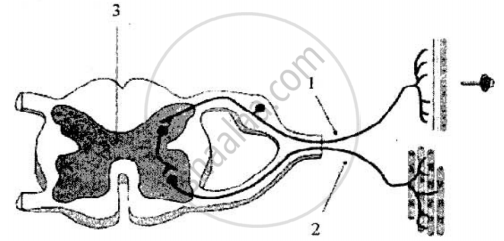Advertisements
Advertisements
प्रश्न
How do we detect the smell of an agarbatti (incense stick)?
उत्तर
When the smell of the incense stick reaches to our nose then the factory receptors present in our nose detects it send this information in fore brain in the form of electrical signals. The brain interprets this information as the smell of incense sticks where it is already stored.
APPEARS IN
संबंधित प्रश्न
Which part of the brain maintains posture and equilibrium of the body?
What is the role of the brain in reflex action?
How are involuntary actions and reflex actions different from each other?
The diagram given below shows the internal structure of a spinal cord depicting a phenomenon. Study the diagram and answer the questions:

1) Name the phenomenon that is depicted in the diagram. Define the phenomenon.
2) Give the technical term for the point of contact between the two nerve cells.
3) Name the parts numbered 1, 2 and 3.
4) How does the arrangement of neurons in the spinal cord differ from that of the brain?
5) Mention two ways by which the spinal cord is protected in our body.
Give three examples of reflex actions.
Put a tick mark (✓) against the correct alternative in the following statement:
The smell of good food causes watering of your mouth. It is a
Differentiate between the following pair of terms:
Stimulus and impulse
Multiple choice question. Tick (✓) the correct choice:
Reflex actions occur under the control of
- brain
- medulla oblongata
- spinal cord
- cerebrum
State whether the following is simple reflex, conditioned reflex or neither of the two.
Contraction of eye pupil
Explain the mechanism of reflex action with the help of a suitable diagram.
List in tabular form two differences between reflex action and walking.
List in tabular form three distinguishing features between cerebrum and cerebellum.
State whether the following is
Constriction of pupil
State whether the following is simple reflex, conditioned reflex or neither of the two.
Lifting up a book
State whether the following is
Salivation when food is put in the mouth.
Give an example for conditioned reflexes.
Why have reflex arcs evolved in animals?
State whether the following is simple reflex, conditioned reflex or neither of the two.
Sneezing
